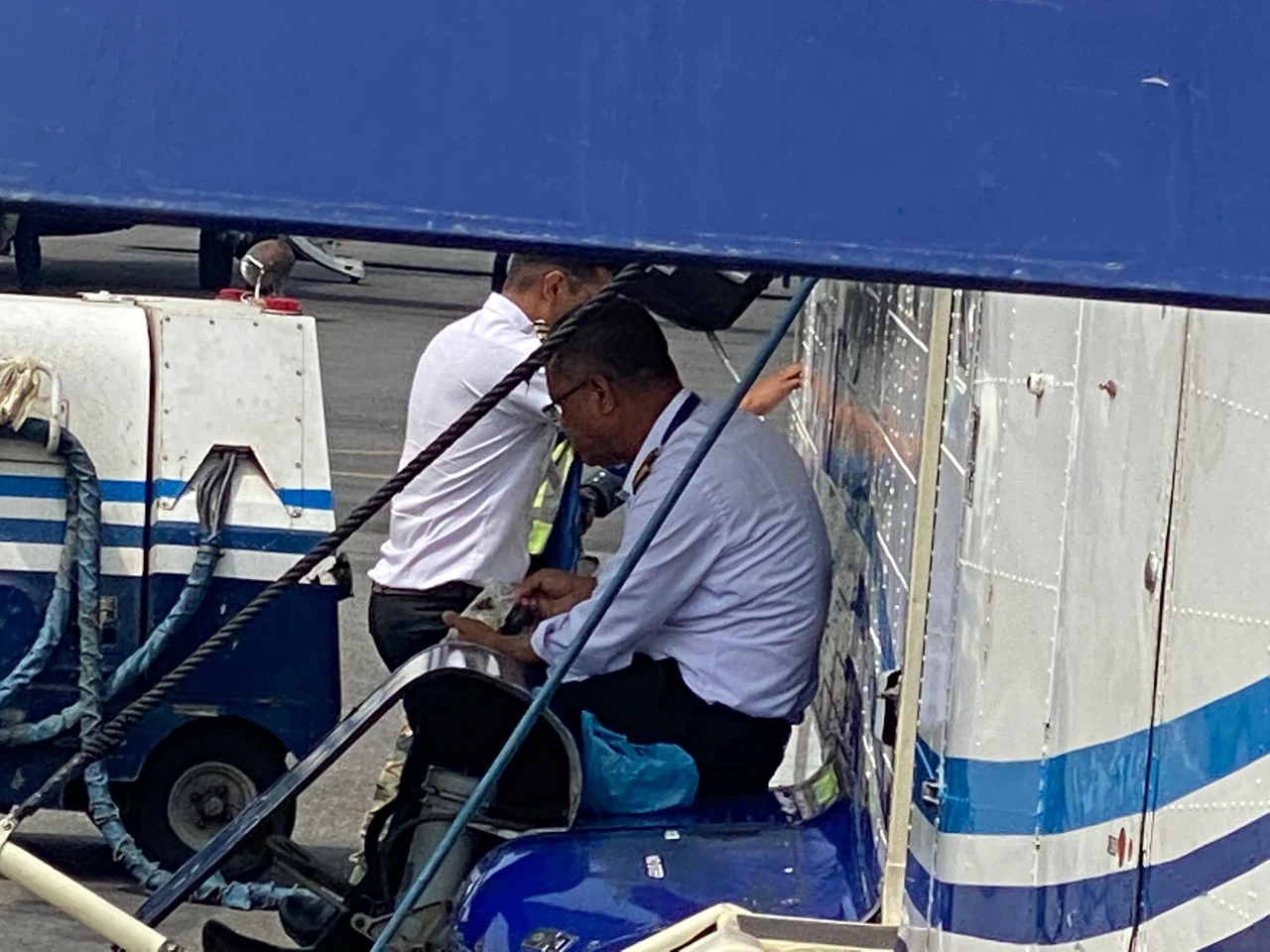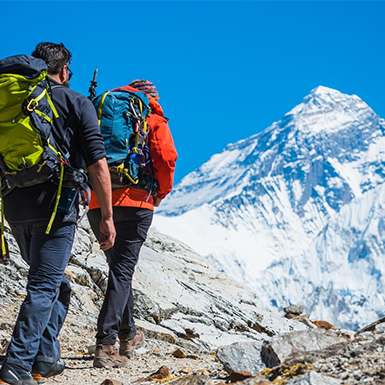My foreign friends often ask me with pride, “So, you must have been to the Everest Base Camp, right?” My response used to be, “I have plans for a quick Base Camp trek.” They would enthusiastically reply, saying, “I have also had a big dream to trek to the Everest Base Camp.”
When Tul Bahadur Kandel, the former president of the Rotary Club of Bhaktapur, informed me about the approval of a global grant for a drinking water project in Forche village of Solukhumbu, I felt a glimmer of hope that my wish was about to come true.
As the New Year 2079 began on the 12th of Baisakh, the program for handing over the Forche project was scheduled. A notice was circulated to register the names of participants who wished to participate in the program. The captivating views of the Khumbu region filled me with enthusiasm, and I quickly registered my name.
The journey was confirmed. The first challenge was to secure a flight ticket to Lukla. As the trekking season had started, Nepalis had to pay almost double the fare compared to Indians and twice as much as other foreigners. Securing a ticket amidst such tough competition was a great victory for Nepalis.
Four of us, including Tul Bahadur Kandel, decided to go on the project trip with the club. After a week of effort, he managed to get tickets at a price for Indian citizens only.
We found the price to be high. It was challenging to cover all the travel expenses and stay for five days on our own. This difficulty highlighted the need for more participation from Rotary Club members in this project.
Ultimately, only Matrika Gautam and I could go on the trip. We successfully purchased tickets at the Nepali rate.
The project site was located at an altitude of 3800 meters. Our main objective was to hike to Everest Base Camp, so we arrived at the Sita Air Counter at 7:30 in the morning, fully prepared. The flight was scheduled for 8 o’clock, and we had no time to spare. We were afraid of missing the flight.
I had to call a friend for ticket assistance and started searching for another counter. Everyone said that the only available counter was for Sita Airlines. After some time, we spotted a person.
We asked him, “Why is the counter closed?”
He replied, “We were looking for you at 7 o’clock. You were late. Look for the counter person; I’ll call him.”
The plane had departed, but the counter person had yet to arrive.
I called another person who could help us with the ticket and explained the situation in detail. After about 10 minutes, someone arrived at the counter, and we got boarding passes without the flight time being mentioned.
When we arrived at the airport two hours after receiving the boarding pass, we tried to meet someone from the airline to get information about the flight. Unfortunately, we couldn’t find any representative of the airlines.
We approached Summit Air’s representative for some information.
He said, “Small and unreliable airlines are like this. Even Lukla flights are not guaranteed. You might get a flight if it’s Lukla, but it’s not always certain.”
He commented, “Look, do you want to see a representative or counter of Nepal Airlines? This is another example of incompetence.”
We were surprised and amused by the sarcastic comment about the national airline.
I still remember the days when foreign passengers used to have their first flight experience with “Royal Nepal Airlines.”
Now, people are willing to wait a week for any other airline, but “Nepal Airlines” doesn’t interest anyone. Unfortunately, even those who go to Gulf countries now fly with Nepal Airlines!
Matrika said, “First, it was Royal Nepal Airlines; now it’s Nepal Airlines.” We laughed for a while, even though we didn’t want to.
We waited for nearly three hours without any information from the empty counter. We were hungry and bought fried rice for 300 rupees. Finally, we went to the Sita Airlines ticket counter and made a special request to the police officer for information about the flight.
They replied, “The Lukla flight is uncertain due to weather conditions. The morning flight from Lukla is not available.”
We felt disappointed and frustrated that someone else had taken our flight. But we didn’t say anything.
“Flights will take off when the weather permits. Please wait in the waiting area,” they said, providing no other options.
Twenty minutes later, a boy came to my seat and asked, “Are you not going to Lukla?”
I replied, “Yes.”
“Come, the flight is about to depart,” he said hopefully. We hurriedly went to Gate No. 3.
The Lukla gate opened, and the flight to Kathmandu took off. However, due to air traffic at Kathmandu Airport, the plane from Lukla couldn’t land.
Since Lukla’s weather could deteriorate at any moment, the airline took us back to the ground before the flight transfer. It was part of their plan to ensure a successful flight transfer.
After about 30 minutes, the plane arrived inside the bus on the ground. But we received information that Lukla’s weather had worsened again.
Some flights took off, but Lukla’s weather remained unfavorable after 10 o’clock.
We were waiting inside the bus. We saw the hungry pilots sitting inside the plane, eating quickly.

The pilots also hoped that Lukla’s weather would clear up so they could fly.
Due to regulations that prevented keeping luggage on board for an extended period, the cargo couldn’t be loaded either. A decision was made during the bus ride.
After 10 minutes, another announcement came: “Due to the possibility of the flight not being able to take off today, please return to the waiting area.”
We were taken back and left in the waiting area. We were almost ready to go back home.
Only five of us left for Lukla from Sita Air that day. Two of them were foreigners, and the remaining three were Nepalis. The first flight was for our three friends, scheduled to depart at 6 AM. However, they were bumped off from the later flight, possibly because someone (presumably paying more money) got priority.
The guide expressed great sadness, saying, “This kind of behavior doesn’t reflect well on Nepal when it comes to foreigners.” He was the guide for the two foreigners.
We also had concerns that those who paid extra might take our flight, and our names could be removed from the 7 AM flight.
The first and second flights are usually more reliable in Lukla, Phaplu, Humla, and other regions. That’s why those who have purchased tickets for the third and fourth flights face monetary negotiations at the airport.
“This seems to be the norm,” one of our friends commented.
We needed to determine who manages and controls such activities and additional charges for flights to Lukla, Phaplu, and similar regions.
The guide brother explicitly stated, “Kathmandu’s microbus has discipline. You have to arrive on time with a valid ticket. But the microbus of the tourist areas lacks such discipline.”
Even though two foreigners had paid a significant amount of money, they were still waiting for Lukla flights, and our guide brother had arranged a helicopter for them. I informed my companions about his contact. Eventually, it was confirmed that the foreigners would be flying by helicopter. We also seized this opportunity and negotiated with Dynasty Air.
Employees of Sita Airlines, including the loaders, approached us, offering to arrange tickets for us at around 10,000 to 12,000 rupees. Here too, intermediaries got involved.
We shared this situation with those willing to help us get tickets and requested their assistance in flying without paying additional money for the helicopter.
We heard from some brokers that the price should be at least ten thousand, while others demanded more. However, we were unwilling to pay more than the ticket price. Eventually, with everyone’s help and despite some extra payment, we secured tickets from Dynasty Air at the original price.
After the morning battle until 1 PM, Dynasty Air issued our boarding passes and requested us to proceed to Gate No. 3. We boarded the bus from Gate No. 3 and headed towards the helipad.
A story by Manoj Kumar Kandel


